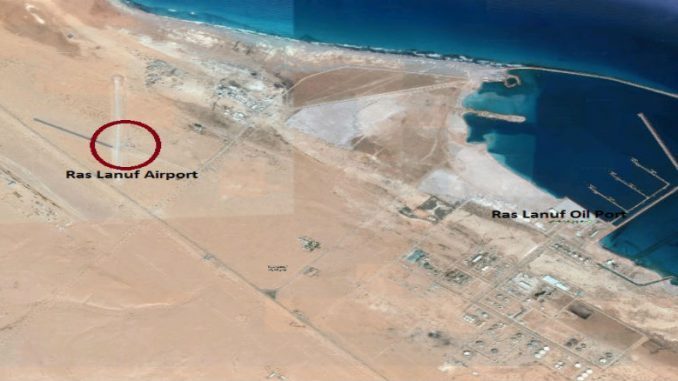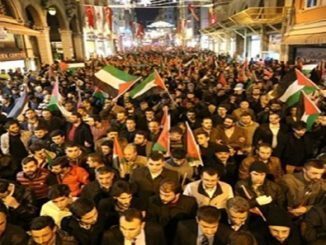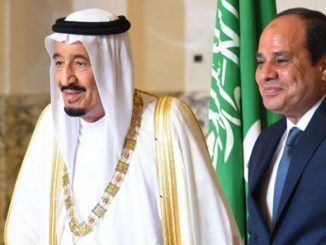
The forces of Libya’s Renegade General Khalifa Haftar in eastern Libya admitted the loss of a key oil export terminal on Saturday which they seized last year.
The spokesperson for Haftar’s forces of eastern Libya said they lost control of a key oil export terminal to forces led by the Benghazi Defense Brigades.
According to Colonel Ahmad al-Mismari, the spokesperson for Haftar’s forces, the Libyan National Army(LNA), Haftar’s militias, had lost control of Ras Lanuf’s main airfield to forces led by Islamists of the Benghazi Defense Brigades.
Mismari said, “The attackers were armed with modern tanks.” He added, “We lost two men. But the battle is ongoing. The situation in the Oil Crescent remains under control.”
Mismari said that Haftar’s air force had carried out strikes “from morning to night” on Friday but had been forced to withdraw by the advance on the airport.
He also accused Tukey and Qatar of providing the militants in the city with guns, ammunition and vehicles.
On Friday, Benghazi Defense Brigades (BDB) took control of Ras Lanuf Airport in central Libya, in addition to Ben Jawad and Nofaliya towns, in a surprise attack on Dignity Operation forces, loyal to Haftar, there.
Benghazi Defense Brigades launched an excessive military operation to facilitate the return of Benghazi internally displaced persons (IDPs)to their city, according to Boshra News Agency, the news outlet of Benghazi Shura Council.
Moreover, the news outlet released a video of BDB forces inside Ras Lanuf Airport, around 230 km west of Benghazi.
Dignity Operation conducted 12 airstrikes to halt BDB forces, but they were all useless, and confirmed their march toward Benghazi will continue, according to BDB sources.
It also said that the military operation, which they called “Return to Benghazi” is not aimed at retaking the oil ports, but rather to help the city’s IDPs, who were forced to leave by Dignity Operation, to return safely to the city, calling the National Oil Corporation and UN-proposed Presidency Council to show neutrality.
On the other hand, demonstrations out broke in both Tripoli and Misrata to back the “Return to Benghazi” military operation.
The Benghazi Defense Brigades are an Islamist militia used to control Libya’s second city until Haftar’s forces ousted them from nearly all of it in an offensive launched in 2014.
In May 2014, Dignity Operation was launched by Haftar’s militia to eradicate Islamists from Libya, who he considers to be terrorists and rival political enemies.
The BDB are allied with eastern tribes opposed to Haftar and members of the Petroleum Facilities Guard which controlled the oil ports before Haftar’s takeover.
This isn’t the first-time Benghazi Defense Brigades tried to take over the “Oil Crescent” in Libya. In December, the BDB carried out a similar attack, they but were Haftar’s forces forced them to retreat.
In January, powerful militias from Libya’s third city Misrata, who are allied with the Tripoli government, joined another such attack.
It is worth to mention that many forces, most of them loyal to the UN-backed government(GNA) in Tripoli, have been involved in efforts to oust Haftar from the oil ports.
However, the Government of National Accord(GNA) denied any involvement in the latest offensive.
The (GNA) Presidential Council, headed by Fayez Al Serraj, denied any relation with the military escalation witnessed in the Oil Crescent area, saying that they have not issued any orders to any military power to move towards the area.
It added, “We strongly condemn any action could undermine the Libyans’ aspirations to reach a political solution for the current crisis.”
It also expressed its condemnation for any serious escalation that would undermine the efforts it exerts to achieve the national reconciliation on internal, regional and international levels.
Moreover, the oil is the wealth of all Libyans and should come out of any conflicts between the Libyan parties, said the Presidential Council.
Losing Oil Terminals Would Shake Haftar’s Power
The lion’s share of Libya’s oil exports is concentrated at are four ports along the “Oil Crescent” on the eastern part of the Gulf of Sirte.
The exports from the four ports constitute the main source of hard currency income and without them, Libya’s once huge currency reserves are being rapidly depleted.
It is worth to mention that Haftar’s power over Ras Lanuf and the other three eastern oil ports last year has empowered Libya’s strong military man to challenge the authority of the UN-backed government in Tripoli(GNA) and demand a major role in a ruling the country.
Haftar was also promoted by Tobruk House of Representative (HoR) as Field Marshall after he controlled the Oil Crescent eastern Libya.
The Libyan National Army (LNA) led by Haftar had taken over oil facilities in eastern Libya from Petroleum Facilities Guards, a rival militia force allied to the UN-backed government in the capital, Tripoli.
The LNA forces seized Zueitina, Brega, Ras Lanuf and al-Sidra in a lightning offensive that dealt a major blow to the UN-backed Government of National Accord.
Haftar is a military figure that is backed by the Tobruk government, based in eastern Libya and refuses to recognize the U.N.-backed government.
He enjoys the support of several Arab nations, including Egypt, the United Arab Emirates, and Jordan, as well as western countries such as France.
The Egyptian Armed Forces have been mandated to protect the joint borders from the sea to the Libyan-Sudanese borders.
In fact, Haftar had previously requested the Egyptian army to protect Libyan/Egyptian borders from Imsaad, in the north, to the Libyan/Sudanese borders, as well as the maritime boundaries between both countries, “meaning that Haftar has granted Egypt unprecedented authority on Libyan territory,” said Libya Prospect.
He also said the oil tankers transporting Libyan petrol from Haftar-controlled regions in the east will be under Egypt’s authority in practice, the oil tankers will only be able to carry the oil and export unless Cairo approves.
In this context, there were strong indications that Haftar succeeded in controlling the oil terminals eastern Libya with the assistance of the Egyptian Armed Forces.
Egypt warplanes assisted Haftar’s forces against the Petroleum Facilities Guards (PFG) who tried to regain control over Ras Lanuf oil terminal and the Gulf of Sidra. However, the PFG -led by Ibrahim Jadhran- have withdrawn from the Oil Crescent region in east Libya as a result of the warplanes attack.
At that time, the Defense Ministry in the UN backed government indicated that “foreign warplanes have played a key role in defeating PFG forces.”
Libya Observer cited local media which reported that the “PFG accused Egypt and the UAE of bombing their forces near the residential district of Ras Lanuf. Four PFG fighters were killed in the airstrikes.”
The Defense Minister-designate Al-Mihdi Al-Baraghati told Ajwa Net that “There are strong indications that the UAE and Egyptian warplanes bombed PFG forces in Ras Lanuf and Sidra, we are now making sure of these indications.”
Accordingly, the takeover of oil terminals from Haftar’s forces would probably has negative repercussions on his political position in negotiating with the GNA and the international community to maintain his status in the political arena, unless he succeeded with his allies, as Egypt’s al-Sisi, to restore back the country’s rich resource.
The Effect of the Offesnsive on the Confidence in Libya’s Oil Industry
According to Libya Herald, a Libyan newspaper,” Whether the BDB and its allies will continue, their offensive is unclear, but it will probably damage the confidence in Libya’s oil industry.”
The attack comes just as the National Oil Corporation (NOC) chief Mustafa Sanalla had been highlighting production gains, which hit 700,000 barrels per day in February.
Thanks to the reopening of oil ports in the Oil Crescent, which was wrestled from the Petroleum Facilities Guard by the LNA and handed to the NOC, Libya has managed more than double its crude oil output from 300,000 bpd in September.
Moreover, Sanalla has just signed a deal with Russian state oil giant Rosneft, last week, hoping it will herald the return of more international oil companies to Libya.
In addition, NOC had plans to bring daily production to 1.1 million barrels by the end of 2017.
However, the NOC had pull all its staff out of the two terminals, as reported it was reported today after the attack.
Since the Libyan Revolution that overthrew the long-time dictator 2011 Muammar Gaddafi, violence has spread in Libya among the different Libyan factions.
Two rival governments operate in Libya, with self-proclaimed authorities controlling the capital of Tripoli and adjacent western areas and an internationally recognized government, based in the eastern Libyan city of Tobruk.
Moreover, a third government was formed known as the Government of National Accord(GNA) supported by many western countries. The government has so far failed to restore the country’s unity.
None of the governments has a complete dominance over Libya until now.



